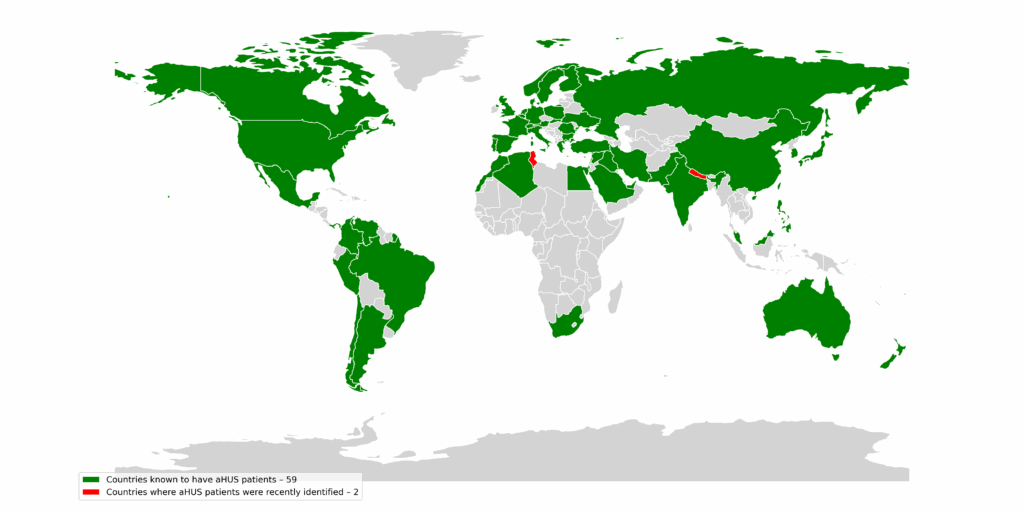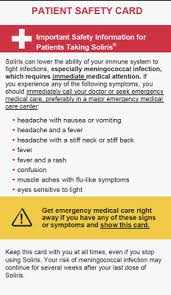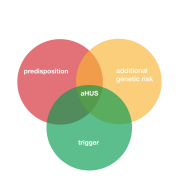In the ever-evolving world of rare disease advocacy, each milestone marks not just progress, but hope. Today, hope takes on a new form as we welcome an additional country into the global aHUS town
—a community bound not by borders but by shared experience, resilience, and the unwavering belief in a brighter future for those affected by atypical Hemolytic Uremic Syndrome (aHUS).
Launched last month with a call out to the community to add to the known global connection between aHUS advocacy and countries, the concept of a “Global aHUS Town” isn’t just a metaphor
—it’s a living, breathing network of patients, caregivers, clinicians, and advocates stretching across continents. In such a town knowledge flows freely. Empathy knows no language barrier. Innovations and victories, no matter how small, ripple outward, carried on the wings of global collaboration.
Each country that joins this town brings with it a unique voice, a new set of stories, and invaluable perspectives that enrich the whole.
The new country, Tunisia, expands our town numbers to 61 countries.
At first glance, welcoming a new country may seem like a simple act of growth. But for the aHUS community, it signifies much more. It is an affirmation that the reach of advocacy is widening and the way it is happening.
A relative of a young aHUS patient in Tunisia first contacted the longest existing aHUS patient advocacy site , www.aHUS.org belonging to the Atypical HUS Foundation in the USA and made connection. Although not from Tunisia herself she had some concerns about her nephew’s HUS diagnosis and his hypertension care treatment and wanted to know if what was happening to him was right.
Patient advocates cannot give advice so the Foundation asked another patient advocate leading aHUS Rest of the World ( an aHUS alliance initiative) if he knew of any aHUS doctors that could help the Tunisian doctors.
There are many known aHUS experts, and a list was sent to the the Aunt.
The advice asked for was about typical HUS treatment and use of eculizumab. But later it emerged that his doctors were leaning towards an aHUS diagnosis but because of approachability issues sharing the international expert list with them was deferred.
Global Action were told about Tunisian tale and looked for Tunisian aHUS research publications to guage expertise in the county.
There were several covering aHUS genetic, familial and gender research including:
Atypical hemolytic uremic syndrome and mutation analysis of factor H gene in two Tunisian families by Habibi et al
Atypical hemolytic uremic syndrome: A monocentric adult Tunisian study and review of literature by Kherder– Elfkih et al
RENAL PROGNOSIS OF HEMOLYTIC UREMIC SYNDROME IN ADULTS by Bouafif et al
This shows not only that there are other aHUS patients in Tunisia, although several have died, but collectively there are many co author doctors who have studied aHUS patients in expert detail.
These were shared with the Aunt to have more local expert contacts.
Nothing further came of the connection in terms of setting up national advocacy in particular so no Tunisian aHUS patient group as yet.
Except more is now known about dozens of aHUS patients in Tunisia (probably no more than 40 in all) and what has happened to them. There is even evidence of a unique Complement Factor I mutation within the Tunisian aHUS population.
But someone who once felt isolated, now find themselves woven into a global support network.
The challenges of living with aHUS are formidable: the unpredictability of relapses, the complexity of and access to treatment, and the emotional burden of having a rare diagnosis. For many, especially in countries where aHUS is less recognized, the journey can feel especially lonely. The arrival of a new country to the aHUS town means resources, support, and solidarity are brought a step closer to those who need them most.
So Tunisia has become the 61st country to join the Global aHUS Town.
How does a new country come to join the global aHUS town?
The path is as varied as the people who walk it. Sometimes, it begins with a single patient or caregiver or relative , determined to seek answers and connection as was the case for Tunisia.
Sometimes, it could be a dedicated clinician, moved by the needs they witness, who reaches out to global networks. And sometimes, a nation’s healthcare system itself takes steps to recognize aHUS, paving the way for broader participation in research, registries, and collaborative care.
Or it could be spotted by anyone participating in aHUS social media who comes across a patient/patients in a country not yet on our world map and letting Global Action know.
No matter the path all can add to the “connected reach” that the Global aHUS Town makes visible. The Global aHUS town becomes a hub for connection, information and collaboration.
Now we celebrate our new arrival in Town.
If you have noticed how unconnected African countries are in our world map Tunisia adds some colour.

We continue our search.
A call to action to everyone, patients, caregivers, clinicians, advocates, and allies to connect the reach with more countries by aHUS Awareness Day 2025.
Together we are a movement.
Article No. 747
aHUS Awareness Day is on 24 September.


